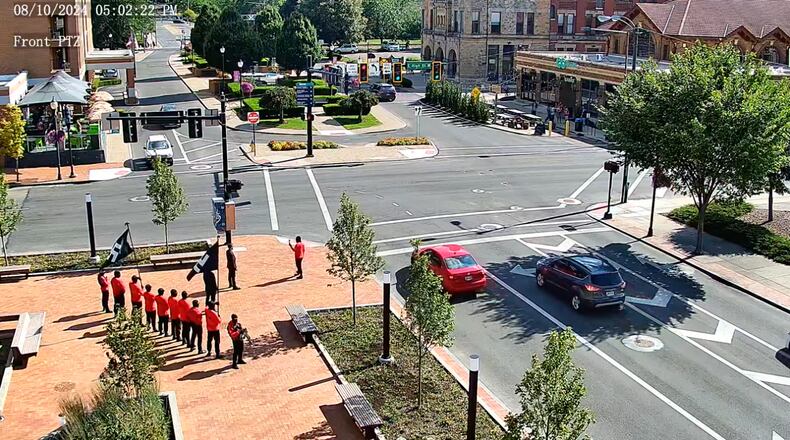We are deeply concerned for the safety of Springfield residents, including the estimated 12,000 to 15,000 Haitian immigrants now living here legally.
A social media post originally from a Springfield Facebook group went viral nationally in recent days. The post, which was quickly debunked by this news outlet, incorrectly identified an incident that occurred in Canton, Ohio, in which a woman was charged with cruelty to companion animals for allegedly killing and eating a cat. The woman was not Haitian and had no connection to the Haitian community in Springfield.
We repeat: There is no evidence to substantiate the hateful, racist accusations that Haitian immigrants in Springfield, Ohio are doing anything to people’s pets.
The events of this week stand against the backdrop of a tumultuous year in Springfield. Public meetings have been derailed by hateful rhetoric against the Haitian immigrants. Armed Neo-Nazi groups have demonstrated in downtown Springfield and appeared at Commission meetings.
“We tell our kids — I’m the mother of three school-aged kids — we tell our kids not to bully one another, and I hear adults in our community saying the most hateful things, the very things we caution our children against,” Clark County Commission President Melanie Flax Wilt, a lifelong county resident, said this week. “That’s not the community we are. We are Clark County, Ohio. We are Springfield, Ohio, and that is not the community we want to be.”
This news organization is asking our readers to push back against the tide of misinformation before it leads to violence. We stand firmly with the residents of Springfield seeking to find peaceful, reasonable solutions to the challenges facing our community.
Regardless of the circumstances that brought Haitian immigrants to Springfield and irrespective of any of the many failings of our federal immigration policy – they are here now.
“We may seem like a challenge, but we are an opportunity,” said Johnson Salomon, a native of Haiti who now works as a patient advocate at Rocking Horse Community Health Center. “We come with almost nothing, but we are a hard-working people. We aren’t here to invade or to take over anything; we are fighting hard to survive and to contribute to the community. Our children will be going to school here and will become future teachers and medical professionals and police officers.”
We commend the excellent work being done by Springfield’s leaders, such as Mayor Rob Rue and other elected officials who have been recently thrust into the national spotlight.
“Rumors like this are taking away from the real issues such as issues involving our housing or school resources and our overwhelmed healthcare system,” Rue said.
We have diligently reported on issues related to housing, traffic, public safety, education, healthcare and more. We welcome the support of Gov. Mike DeWine and appreciate his office’s refusal to engage in furthering the spread of misinformation.
“Look, my job is to tell what the facts are, and what we’re seeing,” DeWine said, “and I rely on, frankly, on Mayor Rue and other officials and county officials. They are the ones who are there, they are the ones who know what’s going on.”
Responsible leadership requires following the facts. It is incredibly irresponsible – and dangerous – for candidates and elected officials to traffic in unsubstantiated rumors in order to advance a political agenda.
Haitians have already been the victims of hate crimes. A Springfield man was convicted last year of hate crimes against at least eight Haitian nationals in the city. Investigators said the man traveled through Springfield looking for individuals he believed were from Haiti and would then attack, usually punching them and knocking them to the ground before robbing them of their money, cellphones, a vehicle and other personal belongings.
Hateful rhetoric around immigrants has led to even worse violent outcomes in the past, such as the tragedy in 2019 where a man killed 21 and injured 22 others in a mass shooting at a Walmart in El Paso. The shooter admitted that he killed and wounded people at the store because of the national origin of the people he expected to be there.
We can’t stand by and wait for a tragedy like that to happen in Springfield.
Given the heightened tensions of the last week, we ask our readers to be careful with the information they choose to share with their friends and family. Misinformation may not begin with you, but once you encounter it, you can choose to have it end with you. Exercise a healthy dose of skepticism with any media you consume. Question its source – and the motivations of those spreading it.
Trust is increasingly rare in today’s media ecosystem. According to a Reuters report, 72% of Americans expressed concern about what is real and what is fake when it comes to online news. With so much uncertainty and with an increasing number of bad actors, it might seem easier to disengage with current events and the world around you.
We implore you to do the opposite. Our community needs you now, more than ever. There are a number of ways for you to effect positive change in Springfield. You can support organizations on the front lines of providing aid to the most vulnerable in our community with your donations or by volunteering. You can choose to be discerning in the information you consume and share with others.
To all Springfielders, new and old: We remain committed to providing quality local journalism that helps unite our community through factual reporting and identifying solutions for a brighter tomorrow.
About the Author
